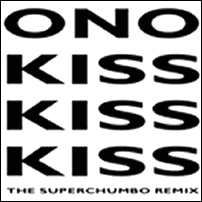Kiss Kiss Kiss (Yoko Ono song)
Kiss Kiss Kiss is a song by Yoko Ono, released in 1980 as part of the album Double Fantasy, a collaborative effort with her husband John Lennon. The song is notable for its experimental sound, blending elements of rock, new wave, and avant-garde music. It also gained attention for its explicit content and the sound of a woman's orgasm, which was considered quite bold and controversial at the time of its release.
Background[edit | edit source]
Kiss Kiss Kiss was one of the tracks from Double Fantasy, an album that marked the return of John Lennon and Yoko Ono to the music scene after a five-year hiatus. The album was released just three weeks before Lennon's assassination in December 1980, making it the last album of new material he would release in his lifetime. Double Fantasy was intended to showcase both Lennon and Ono's artistic contributions equally, alternating between songs by each artist.
Composition and Lyrics[edit | edit source]
The song features a driving beat, angular guitar riffs, and experimental sound effects, characteristic of Ono's avant-garde musical style. The lyrics of Kiss Kiss Kiss explore themes of love and sexuality, with Ono's vocal performance ranging from whispers to screams. The inclusion of a woman's orgasm sounds towards the end of the track was a provocative choice that sparked both acclaim and controversy.
Reception[edit | edit source]
Upon its release, Kiss Kiss Kiss received mixed reviews from critics. Some praised its boldness and innovative approach to exploring sexual themes in music, while others found it too avant-garde or controversial. Despite the mixed critical reception, the song has since been recognized as a pioneering work in the genre of experimental rock and new wave.
Legacy[edit | edit source]
Over the years, Kiss Kiss Kiss has been re-evaluated by music critics and scholars as an important piece in Yoko Ono's discography, as well as in the broader context of feminist and avant-garde music. It has been cited as an influence by a number of artists in various genres, showcasing Ono's ahead-of-her-time approach to music and art.
See Also[edit | edit source]
Search WikiMD
Ad.Tired of being Overweight? Try W8MD's physician weight loss program.
Semaglutide (Ozempic / Wegovy and Tirzepatide (Mounjaro / Zepbound) available.
Advertise on WikiMD
|
WikiMD's Wellness Encyclopedia |
| Let Food Be Thy Medicine Medicine Thy Food - Hippocrates |
Translate this page: - East Asian
中文,
日本,
한국어,
South Asian
हिन्दी,
தமிழ்,
తెలుగు,
Urdu,
ಕನ್ನಡ,
Southeast Asian
Indonesian,
Vietnamese,
Thai,
မြန်မာဘာသာ,
বাংলা
European
español,
Deutsch,
français,
Greek,
português do Brasil,
polski,
română,
русский,
Nederlands,
norsk,
svenska,
suomi,
Italian
Middle Eastern & African
عربى,
Turkish,
Persian,
Hebrew,
Afrikaans,
isiZulu,
Kiswahili,
Other
Bulgarian,
Hungarian,
Czech,
Swedish,
മലയാളം,
मराठी,
ਪੰਜਾਬੀ,
ગુજરાતી,
Portuguese,
Ukrainian
Medical Disclaimer: WikiMD is not a substitute for professional medical advice. The information on WikiMD is provided as an information resource only, may be incorrect, outdated or misleading, and is not to be used or relied on for any diagnostic or treatment purposes. Please consult your health care provider before making any healthcare decisions or for guidance about a specific medical condition. WikiMD expressly disclaims responsibility, and shall have no liability, for any damages, loss, injury, or liability whatsoever suffered as a result of your reliance on the information contained in this site. By visiting this site you agree to the foregoing terms and conditions, which may from time to time be changed or supplemented by WikiMD. If you do not agree to the foregoing terms and conditions, you should not enter or use this site. See full disclaimer.
Credits:Most images are courtesy of Wikimedia commons, and templates Wikipedia, licensed under CC BY SA or similar.
Contributors: Prab R. Tumpati, MD

